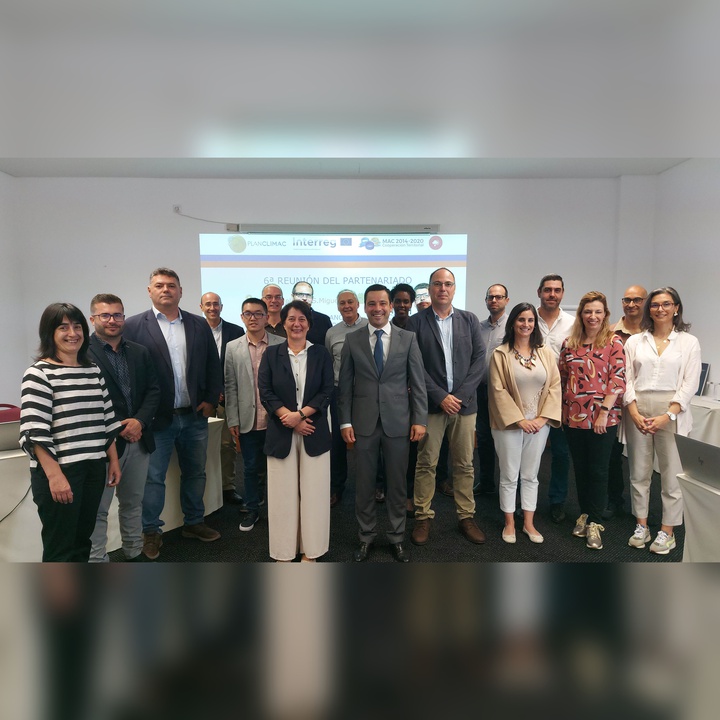Text size:
News

Regional Secretariat for the Environment and Climate Change hosted the partners' meeting of the PLANCLIMAC project
June 2, 2023
The Regional Secretariat for the Environment and Climate Change hosted recently, on the island of São Miguel, the 6th partners' meeting of the PLANCLIMAC Project – Planning, Monitoring and Observation, Improvement of Knowledge and Awareness for Risks and Threats of Climate Change in Macaronesia.
According to the Regional Secretary for the Environment and Climate Change, Alonso Miguel, the objective of this project is to “reconcile the scientific knowledge and technological capacity of the Macaronesian Region to provide tools to facilitate the implementation of adaptation and preparation policies regarding the natural risks imposed by climate change”.
“As ERDF beneficiary, the Regional Secretariat for the Environment and Climate Change channelled to the Autonomous Region of the Azores, an outermost region, a support co-financed at 85% by the European Union, in the total amount of 412,521.89 €, under the Interreg Madeira-Azores-Canary Islands (MAC) Territorial Cooperation Programme 2014-2020,” he explained.
Concerning the event, the governor explained that its purpose was to carry out a financial and technical follow-up of the project, "namely through its contextualisation, the explanation of the goals and objectives achieved by the partners from the Azores, Madeira, Cabo Verde, the Government of the Canary Islands, ULPGC, ULL and Gesplan and, finally, the discussion about the future plans of the PLANCLIMAC project.
“In force since November 2019, with an extended deadline of October 2023, for reasons arising from the pandemic, this project has been marked by the development of a significant range of actions, such as the Manual of Best Practices for the Protection of Water Resources, the Specific Guide for the Implementation of the Integration of Climate Change in the Strategies of Territorial Management Instruments, the Guide with Guidelines for the Integration of Risk Cartography in the PDM, the installation of new limnographic stations in eight lakes in the Region, the Communication and Capacity Building Plan, the improvement of IRERPA in the sector of soil use, as well as the Guide for the Definition and Delimitation of Flood Risk in the Streams of the Azores”, stated the governor.
These methodological guides aim to ensure the consistency of the information to be produced by the various studies and work in the area of public safety and property and delimitation of risk areas for 20, 50 and 100-year flood return periods, considering climate scenarios in strategies of Territorial Management Instruments.
“Through strategic cooperation between its beneficiaries, PLANCLIMAC carried the mission of promoting knowledge and environmental awareness to empower the Macaronesia regions to combat and mitigate the effects of Climate Change,” explains the Secretary of the Environment.
He continued: “with the implementation of measures such as the creation of a Macaronesian Climate Change Observatory, a Macaronesian Inventory of Climate Change and the emphasis placed on the analysis of the influence of climate change on desertification, and the management of flood risk in coastal areas and watercourses, there is a strong bet on the cohesion between the project participants to provide the exchange of information, experiences and production of knowledge, putting technology and science at the service of the creation of tools that will be indispensable to the climate transition and the adaptation of the Autonomous Region of the Azores to environmental, social and cultural challenges that result from climate change”.
Still under the aegis of PLANCLIMAC, a set of tasks are under development, also of high interest and concrete usefulness for the sustainable development of the Autonomous Region of the Azores, namely training actions, the Good Building Practices Manual based on Bioclimatic Architecture and Energy Efficiency Principles a video/documentary on climate change adaptation, an exhibition of educational panels for primary and secondary schools on climate change, dissemination and awareness material for the general population, and finally, a repository of documents related to climate change, by typologies, in Macaronesia.

